11 Best Herbal Teas For Endometriosis Pain
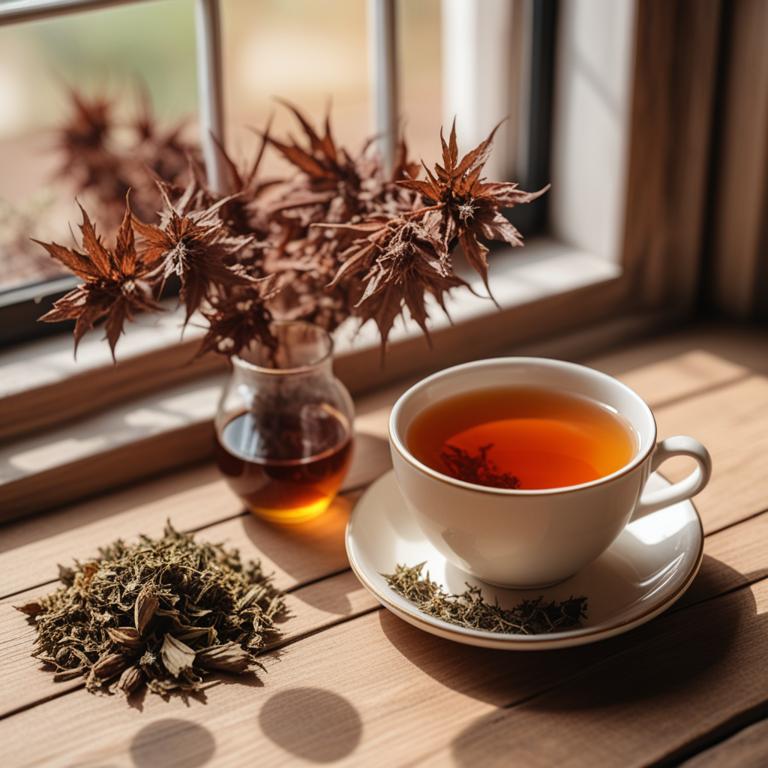
Herbal teas for Endometriosis pain are a natural remedy that refers to the use of plant-based teas to alleviate the symptoms of endometriosis, a chronic condition characterized by the growth of endometrial tissue outside the uterus, leading to severe pain, inflammation, and discomfort.
These herbal teas can treat this ailment by reducing inflammation, promoting relaxation, and regulating hormonal imbalances, which are often associated with endometriosis.
Examples of herbal teas that can help alleviate endometriosis pain include Ginger tea, which reduces inflammation and nausea; Turmeric tea, which contains curcumin that has anti-inflammatory properties; Red Clover tea, which has estrogen-regulating properties that can help reduce pain; Peppermint tea, which relaxes the muscles and reduces cramps; and Chamomile tea, which promotes relaxation and calms the mind.
Additionally, other herbal teas such as Dandelion tea, Raspberry leaf tea, and Lavender tea have also been found to help alleviate endometriosis pain due to their anti-inflammatory, antispasmodic, and hormone-regulating properties.
Related Study
According to "Human reproduction update", teas for endometriosis pain may provide relief due to their potential anti-inflammatory and pain-alleviating properties, which are attributed to mechanisms of action such as cytokine suppression, COX-2 inhibition, and antioxidant effects.
Below there's a list of the 11 best herbal teas for endometriosis pain.
Table of Contents
Also, you may be interested in...
Today Free Bonus!
The Ultimate Herb Drying Checklist
(For Long-Lasting Powerful Medicinal Effect)
How to easily dry herbs that don't mold and that keep their strong medicinal power for more than 1 year.
1. Ginkgo biloba teas

Ginkgo biloba teas have been explored as a potential natural remedy to alleviate endometriosis pain, a chronic condition characterized by the growth of endometrial tissue outside the uterus.
The flavonoids and terpenoids present in Ginkgo biloba, such as quercetin and bilobalide, possess anti-inflammatory and antioxidant properties that help to reduce inflammation and oxidative stress associated with endometriosis.
These bioactive constituents may also modulate prostaglandin synthesis, thereby contributing to the reduction of pain and discomfort experienced by endometriosis sufferers.
The benefits of Ginkgo biloba teas in treating endometriosis pain include reduced menstrual cramps, improved mood, and enhanced overall well-being.
Recipe:
- Gather 1 tablespoon of dried Ginkgo biloba leaves and 1 cup of boiling water.
- Place the Ginkgo biloba leaves in a tea infuser or a small muslin bag.
- Pour the boiling water over the Ginkgo biloba leaves and let it steep for 5-7 minutes.
- Strain the tea and discard the Ginkgo biloba leaves.
- Drink 1 cup of the Ginkgo biloba tea 2-3 times a day to help manage endometriosis pain.
Ginkgo biloba teas can be considered as an alternative remedy to treat endometriosis pain, although its effectiveness is still debated, and it may cause side effects such as dizziness, nausea, and stomach upset in some individuals.
To minimize potential risks, it is recommended to consume Ginkgo biloba teas in moderation, avoid taking them in large quantities, and be aware of possible interactions with other medications, especially blood thinners, as they can increase the risk of bleeding.
Ginkgo Biloba Tea on Amazon
Tai Chi Think Sharp Energizing Tea (Ginseng Ginkgo Biloba) 12 Bags
Disclaimer: We earn a commission if you click this link and make a purchase at no additional cost to you.
2. Glycyrrhiza glabra teas

Glycyrrhiza glabra teas, derived from the licorice root, have been traditionally used to alleviate endometriosis pain due to its anti-inflammatory and antioxidant properties.
The bioactive constituents, such as glycyrrhizin and flavonoids, help to reduce inflammation and oxidative stress, which are major contributors to endometriosis pain.
By reducing inflammation and oxidative stress, Glycyrrhiza glabra teas help to ease the pain and discomfort associated with endometriosis, promoting a better quality of life for those affected.
The benefits of using Glycyrrhiza glabra teas to treat endometriosis pain include reduced pain intensity, improved menstrual cramp relief, and enhanced overall well-being.
Recipe:
- Gather ingredients: 1 cup of dried Glycyrrhiza glabra roots, 1 cup of water, and a tea infuser.
- Measure 1 tablespoon of dried roots and place in the tea infuser.
- Heat 1 cup of water and pour over the roots in the infuser.
- Let it steep for 5-7 minutes, then strain the liquid into a cup.
- Drink 1/2 cup of the tea, 2-3 times a day, as needed for endometriosis pain relief.
Glycyrrhiza glabra teas can be used to treat endometriosis pain, but potential side effects may include water and electrolyte imbalance due to its diuretic properties, as well as high blood pressure and low potassium levels in some individuals.
To minimize risks, it is recommended to consume these teas in moderation and to monitor blood pressure and potassium levels regularly, and also to avoid consuming them for extended periods of time.
Glycyrrhiza Glabra Tea on Amazon
Pukka Herbal Teas Licorice and Cinnamon - 20 Bags, 20 Count
Disclaimer: We earn a commission if you click this link and make a purchase at no additional cost to you.
3. Curcuma longa teas

Curcuma longa teas have gained attention for their potential in alleviating endometriosis pain due to their anti-inflammatory and antioxidant properties.
The bioactive constituents, including curcuminoids, flavonoids, and phenolic acids, in Curcuma longa teas may help to reduce inflammation and oxidative stress associated with endometriosis, thereby alleviating pain and discomfort.
The use of Curcuma longa teas has been shown to help in reducing the severity of endometriosis symptoms by modulating the immune system and improving hormonal balance, which are critical factors in managing the condition.
The benefits of using Curcuma longa teas to treat endometriosis pain include reduced pain intensity, improved quality of life, and a potential decrease in the need for conventional pain medications.
Recipe:
- Gather 1 teaspoon of dried turmeric root (Curcuma longa) and 1 cup of water.
- Boil the water in a pot and let it cool for 1 minute.
- Add the 1 teaspoon of turmeric root to the water and let it steep for 5-7 minutes.
- Strain the tea into a cup and discard the turmeric root.
- Drink the tea 2-3 times a day, ideally on an empty stomach, for relief from endometriosis pain.
Curcuma longa teas can be beneficial in treating endometriosis pain due to its anti-inflammatory properties; however, potential side effects may include stomach upset, diarrhea, and allergic reactions in some individuals.
Precautions to take when using Curcuma longa teas to treat endometriosis pain include monitoring for signs of liver damage, such as yellowing of the skin or eyes, and being cautious with high doses that may interact with other medications or worsen certain medical conditions.
Curcuma Longa Tea on Amazon
Pure Ceylon Turmeric Brew - 100% Organic Ceylon Turmeric Tea Bags (40 Sachets - pack of 2 – 20 COUNT PER BOX)
Disclaimer: We earn a commission if you click this link and make a purchase at no additional cost to you.
4. Zingiber officinale teas

Zingiber officinale teas, also known as ginger teas, have been traditionally used to treat endometriosis pain due to their anti-inflammatory and analgesic properties.
The bioactive constituents of ginger, including gingerols and shogaols, help to reduce inflammation and alleviate pain by inhibiting the production of pro-inflammatory enzymes and cytokines.
By consuming ginger teas, individuals with endometriosis may experience relief from chronic pelvic pain, menstrual cramps, and other symptoms associated with this condition.
The benefits of using ginger teas to treat endometriosis pain include reduced pain and inflammation, improved menstrual cycle regulation, and enhanced overall well-being.
Related Study
According to "Journal of the Medical Association of Thailand = Chotmaihet thangphaet", Zingiber officinale teas showed potent inhibitory activity on nitric oxide and PGE2 production, suggesting its potential anti-inflammatory properties which could be beneficial for alleviating endometriosis pain.
Recipe:
- Gather 1 tablespoon of dried Zingiber officinale root and 1 cup of boiling water.
- Add the Zingiber officinale root to a tea infuser or a small piece of cheesecloth.
- Steep the Zingiber officinale root in the boiling water for 5-7 minutes.
- Strain the tea into a cup and discard the root.
- Drink the tea as needed to help manage endometriosis pain.
Zingiber officinale teas can be used as a potential treatment for endometriosis pain, but it may cause side effects such as stomach upset, nausea, and diarrhea due to its warming and stimulating properties.
To avoid adverse reactions, it is recommended to start with a low dose and gradually increase as needed, and to avoid consuming Zingiber officinale teas on an empty stomach or when experiencing severe menstrual cramps.
Zingiber Officinale Tea on Amazon
FGO Organic Ginger Tea, 100 Count, Eco-Conscious Tea Bags, Caffeine Free, Packaging May Vary (Pack of 1)
Disclaimer: We earn a commission if you click this link and make a purchase at no additional cost to you.
5. Angelica sinensis teas
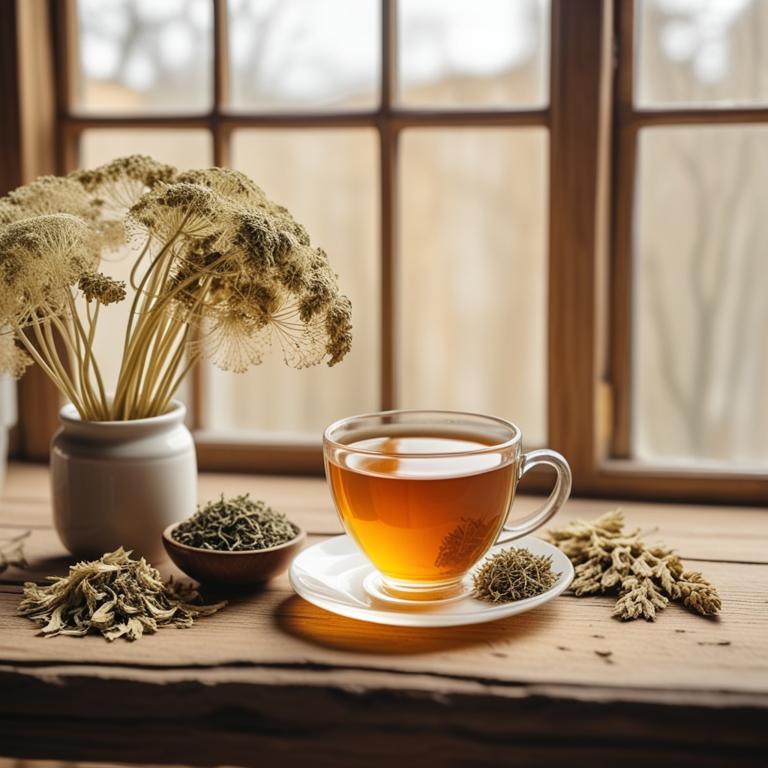
Angelica sinensis teas, also known as dong quai, have been traditionally used to treat endometriosis pain due to its anti-inflammatory and estrogen-regulating properties.
The herbal preparation helps to treat this ailment by reducing inflammation, modulating the body's hormonal balance, and alleviating menstrual cramps.
The bioactive constituents of Angelica sinensis, including ferulic acid, isoflavones, and essential oils, contribute to its therapeutic effects, which can help to ease symptoms of endometriosis.
The benefits of using Angelica sinensis teas to treat endometriosis pain include reduced pain and discomfort, improved menstrual regularity, and enhanced overall well-being.
Related Study
According to the study, Angelica sinensis teas may play a role in improving symptoms associated with endometriosis, including pain, but further well-designed trials are needed to confirm its effectiveness and safety.
Recipe:
- Gather 1 tablespoon of dried Angelica sinensis root, 1 cup of boiling water, and a teapot.
- Measure 1 tablespoon of dried Angelica sinensis root and add it to the teapot.
- Pour 1 cup of boiling water over the Angelica sinensis root in the teapot.
- Steep the mixture for 5-7 minutes, then strain it into a cup.
- Drink the Angelica sinensis tea 2-3 times a day to help manage endometriosis pain.
Angelica sinensis teas can be used to alleviate endometriosis pain, but possible side effects may include dizziness, stomach upset, and allergic reactions such as skin rashes or itching.
Precautions when using Angelica sinensis teas include being cautious with blood thinning, as it may interact with anticoagulant medications, and avoiding it during pregnancy or breastfeeding due to potential hormonal effects.
6. Urtica dioica teas

Urtica dioica teas have been used as a natural remedy to treat endometriosis pain due to their anti-inflammatory and antioxidant properties.
The herbal preparation helps to reduce inflammation and alleviate pain associated with endometriosis by inhibiting the production of pro-inflammatory enzymes and cytokines.
The bioactive constituents of Urtica dioica teas, including flavonoids, saponins, and phenolic acids, contribute to its therapeutic effects by modulating the immune response and reducing oxidative stress.
The benefits of using Urtica dioica teas to treat endometriosis pain include reduced symptoms, improved quality of life, and a potential reduction in the need for pharmaceutical medications.
Recipe:
- Gather 1 cup of fresh or dried Urtica dioica leaves and flowers.
- Combine the leaves and flowers with 1 cup of boiling water in a saucepan.
- Steep the mixture for 5-7 minutes, then strain it into a cup using a cheesecloth or a fine-mesh sieve.
- Add 1 tablespoon of honey (optional) to the tea and stir well.
- Drink 1/2 cup of the tea, 2-3 times a day, for 2-3 weeks to help manage endometriosis pain.
Urtica dioica teas can be used to treat endometriosis pain, but it may cause side effects such as allergic reactions, nausea, and stomach upset in some individuals, particularly those with sensitive stomachs or allergies.
To use this herbal preparation safely, it is recommended to start with a low dose and gradually increase as needed, avoid consuming it on an empty stomach, and be cautious when combining it with other medications or supplements.
Urtica Dioica Tea on Amazon
The Republic of Tea — Organic Nettle SuperHerb Tea Tin, 36 Herbal Tea Bags, Naturally Caffeine-Free
Disclaimer: We earn a commission if you click this link and make a purchase at no additional cost to you.
7. Paeonia lactiflora teas
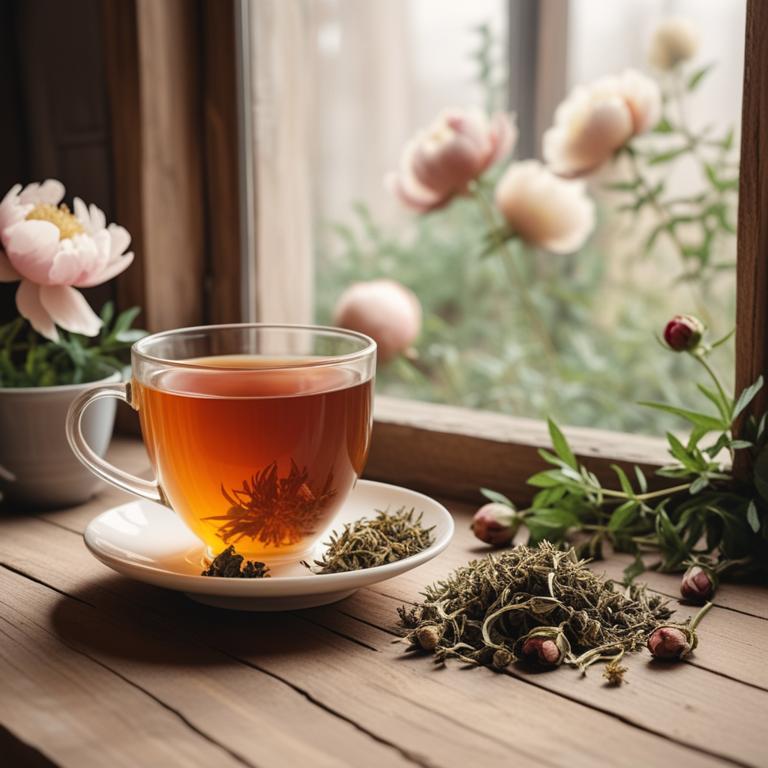
Paeonia lactiflora teas have been traditionally used to treat endometriosis pain due to their anti-inflammatory and antispasmodic properties, which help to soothe and relax the uterine muscles.
The herbal preparation's flavonoids, alkaloids, and saponins contribute to its efficacy in reducing inflammation and pain, making it a potential natural remedy for endometriosis sufferers.
Studies have shown that Paeonia lactiflora teas can help to alleviate endometriosis pain by inhibiting the production of pro-inflammatory cytokines and reducing the expression of pain-related genes.
The benefits of using Paeonia lactiflora teas to treat endometriosis pain include reduced pain intensity, improved quality of life, and a potential reduction in the need for pharmaceutical interventions.
Recipe:
- Gather 2 cups of fresh Paeonia lactiflora flowers. Clean and dry them.
- Measure 1 cup of the flowers and put them in a heat-resistant cup. Pour 2 cups of boiling water over the flowers.
- Let the mixture steep for 5-7 minutes. Strain the liquid using a tea strainer or cheesecloth.
- Measure 1 cup of honey and mix it with the tea liquid. Stir well until the honey dissolves.
- Store the tea in the refrigerator and drink 1/2 cup, 2-3 times a day, to help manage endometriosis pain.
Paeonia lactiflora teas can be used to potentially alleviate endometriosis pain, but its consumption may lead to side effects such as drowsiness, digestive issues, and allergic reactions in some individuals.
When using Paeonia lactiflora teas to treat endometriosis, it's essential to take precautions, including being cautious when driving or operating heavy machinery due to drowsiness, and monitoring blood pressure, as it may interact with certain medications and exacerbate hypertension.
8. Angelica archangelica teas
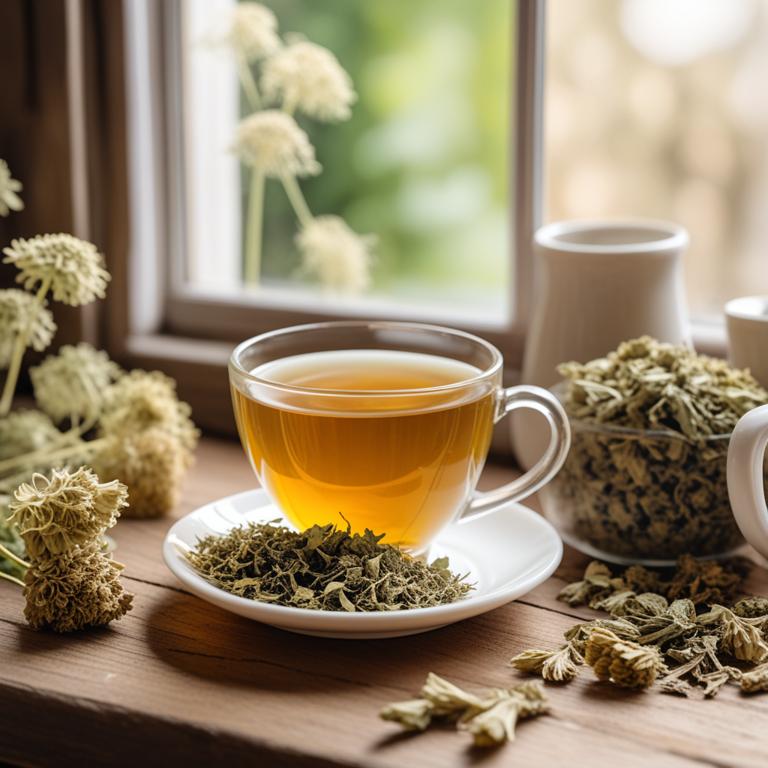
Angelica archangelica teas have been traditionally used to alleviate endometriosis pain due to their anti-inflammatory and antispasmodic properties, which help to reduce pain and inflammation associated with this condition.
The bioactive constituents, including angelan, ligustilide, and butylphthalide, found in Angelica archangelica teas, possess antioxidant and anti-inflammatory activities that contribute to their therapeutic effects.
These teas help to treat endometriosis pain by modulating the body's inflammatory response and relaxing the uterine muscles, thereby reducing cramps and discomfort.
The benefits of using Angelica archangelica teas to treat endometriosis pain include reduced symptoms, improved quality of life, and a potential reduction in the need for pharmaceutical interventions.
Recipe:
- Gather 1 cup of fresh Angelica archangelica roots or 2 teaspoons of dried root powder.
- Combine the Angelica roots or root powder with 1 cup of boiling water in a saucepan.
- Steep for 10-15 minutes to allow the roots to release their properties into the water.
- Strain the liquid and discard the solids. Add honey or sugar to taste if needed.
- Drink 1/2 cup of the Angelica tea 2-3 times a day to help alleviate endometriosis pain.
Angelica archangelica teas can be used as a potential treatment for endometriosis pain, but it may cause side effects such as stomach upset, diarrhea, and allergic reactions in some individuals.
To use Angelica archangelica teas safely, it is essential to start with small doses and gradually increase the amount, as well as to be aware of potential interactions with other medications and to avoid using it during pregnancy or breastfeeding.
9. Vitex agnus-castus teas
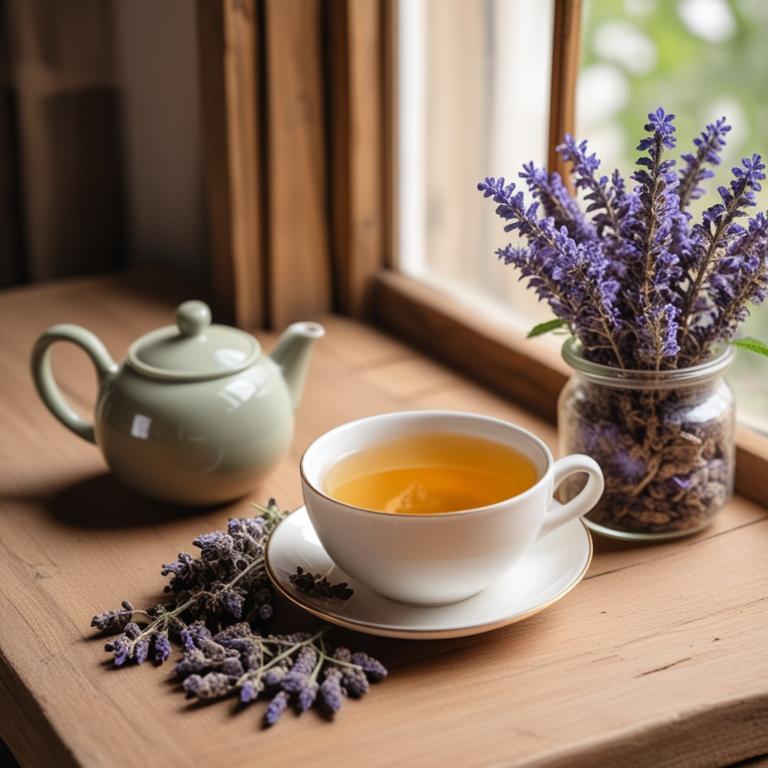
Vitex agnus-castus teas have been traditionally used to treat endometriosis pain due to their ability to regulate menstrual cycles and alleviate symptoms associated with this condition.
The bioactive constituents present in Vitex agnus-castus teas, including iridoid glycosides and flavonoids, are believed to help treat endometriosis by modulating estrogen levels and reducing inflammation.
By reducing estrogen dominance and promoting hormonal balance, Vitex agnus-castus teas have been found to help alleviate symptoms of endometriosis, including pelvic pain and heavy bleeding.
The benefits of using Vitex agnus-castus teas to treat endometriosis pain include reduced reliance on pharmaceutical medications and a more natural approach to managing symptoms, making it a popular alternative remedy for women suffering from this condition.
Related Study
According to "The Australian & New Zealand journal of obstetrics & gynaecology", Vitex agnus-castus teas for endometriosis pain have shown clinical evidence supporting their efficacy in treating menstrual symptoms.
Recipe:
- Gather 1 teaspoon of dried Vitex agnus-castus herb and 1 cup of boiling water.
- Pour the boiling water over the dried herb and let it steep for 5-7 minutes.
- Strain the tea into a cup using a fine-mesh sieve or cheesecloth.
- Add honey or lemon to taste, if desired, and mix well.
- Drink the tea 2-3 times a day to help alleviate endometriosis pain.
Vitex agnus-castus teas can be beneficial in alleviating endometriosis pain, but potential side effects include headaches, dizziness, and stomach upset in some individuals due to its hormonal balancing properties.
To use Vitex agnus-castus teas safely for endometriosis pain treatment, it's essential to start with a low dose and gradually increase as needed, be cautious when combining with other hormonal medications, and avoid consumption during pregnancy or breastfeeding.
10. Cinchona officinalis teas

Cinchona officinalis teas have been traditionally used to treat endometriosis pain due to their anti-inflammatory, analgesic, and antispasmodic properties.
The bioactive constituents of Cinchona officinalis, including alkaloids such as quinine and quinidine, help to reduce inflammation and alleviate pain associated with endometriosis.
By modulating the body's response to pain and inflammation, Cinchona officinalis teas can help to reduce the severity of endometriosis symptoms, providing relief from chronic pain and discomfort.
The benefits of using Cinchona officinalis teas to treat endometriosis include reduced reliance on pharmaceutical medications, improved overall well-being, and a natural approach to managing symptoms associated with this debilitating condition.
Recipe:
- Gather 2 teaspoons of dried Cinchona officinalis bark and 1 cup of boiling water.
- Steep the bark in the boiling water for 5-7 minutes.
- Strain the mixture into a cup using a fine-mesh sieve or cheesecloth.
- Add honey or lemon to taste, if desired.
- Drink the tea 2-3 times a day, as needed, to help alleviate endometriosis pain.
Cinchona officinalis teas can help alleviate endometriosis pain, but possible side effects may include dizziness, nausea, and stomach upset due to its high quinine content.
To use Cinchona officinalis teas safely, it is recommended to start with a low dose, gradually increase as needed, and avoid mixing with other medications or herbal supplements that may interact with its active compounds.
Cinchona Officinalis Tea on Amazon
Quina Roja(chinona) & Palo de Víbora Tea – 100% Natural, Vegan, Hecho en México | 25 Tea Bags
Disclaimer: We earn a commission if you click this link and make a purchase at no additional cost to you.
11. Lavandula angustifolia teas

Lavandula angustifolia teas have been traditionally used to help alleviate the painful symptoms of endometriosis, a chronic condition affecting millions of women worldwide.
The anti-inflammatory and antioxidant properties of this herbal preparation help to reduce pain and inflammation associated with endometriosis, promoting a sense of calm and well-being.
The bioactive constituents of Lavandula angustifolia, including linalool and linalyl acetate, have been shown to have a positive impact on reducing endometriosis pain by inhibiting the production of prostaglandins, which contribute to inflammation.
By incorporating Lavandula angustifolia teas into their routine, women may experience reduced symptoms of endometriosis, improved quality of life, and a natural approach to managing chronic pain.
Recipe:
- Gather 1 cup of fresh Lavandula angustifolia flowers or 1 tablespoon of dried flowers.
- Heat 1 cup of water in a pot until it boils.
- Remove the boiling water from the heat and add the Lavandula angustifolia flowers.
- Let the mixture steep for 5-7 minutes, then strain the tea into a cup.
- Drink 1-2 cups of the tea 2-3 times a day to help manage endometriosis pain.
Lavandula angustifolia teas can be used as a natural remedy for endometriosis pain relief, but it may cause side effects such as drowsiness, headaches, and digestive issues due to its sedative and antispasmodic properties.
Precautions should be taken when using Lavandula angustifolia teas, including avoiding its consumption during pregnancy and breastfeeding, and being cautious with its use in individuals with allergies or sensitive stomachs.
Lavandula Angustifolia Tea on Amazon
Tiesta Tea - Lavender Chamomile Herbal Tea | Loose Leaf | Calming Blend with Chamomile and Lavender | Caffeine-Free Herbal | Great for Hot or Iced Brews | Resealable Bulk Pouch, 200 Cups | 8 Ounce
Disclaimer: We earn a commission if you click this link and make a purchase at no additional cost to you.